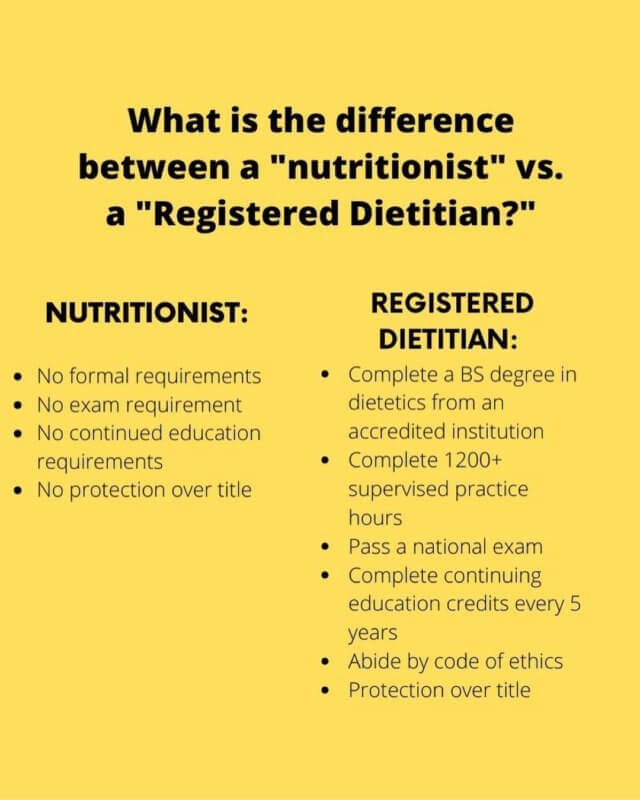All Categories
Featured
Table of Contents
-1
In the United States and numerous other countries, a dietitian is a board-certified food and nourishment professional. They are highly educated in the field of nutrition and dietetics the science of food, nourishment, and their effect on human health and wellness. Via substantial training, dietitians get the knowledge to provide evidence-based clinical nutrition therapy and dietary counseling tailored to meet a person's demands.
-1To clear up, the credentials of RD and RDN are interchangeable. RDN is an extra recent designation. Dietitians can select which credential they prefer to utilize. To make these qualifications dietitians-to-be have to initially gain a bachelor's degree or comparable credit ratings from a recognized program at an university or university. Normally, this needs an undergraduate scientific research level, including training courses in biology, microbiology, organic and not natural chemistry, biochemistry, anatomy, and physiology, as well as even more specific nourishment coursework.
Sports Nutritionists
-1This enables them to evaluate intense needs, focusing on lethal problems. Inpatient and outpatient dietitians likewise provide nutrition education and learning to people with specialized needs, such as those newly out of surgery, in cancer cells therapy, or identified with chronic ailments like diabetes mellitus or kidney condition. In the outpatient setting, they give a lot more thorough dietary therapy working towards a nutrition-oriented goal.
-1They can additionally advocate for public laws with a focus on nourishment, food, and health and wellness problems. Study dietitians typically work in research health centers, companies, or universities. They operate within a study team headed by a primary detective and accomplish nutrition-focused treatments. When dietitians have earned their qualifications and are operating in the area, they can go on to concentrate on a particular subcategory, such as pediatrics or sporting activities dietetics.
-1Others may function as health and nutrition specialists in media or as public speakers (Manage Diabetes Through Diet). Dietitians are certified to take care of nutrition therapy across a period of acute and chronic conditions.
Gym Nutritionist – Kewdale
-1In numerous states, such as Alaska, Florida, Illinois, Maryland, Massachusetts, and Pennsylvania, RDs and CNSs are granted the very same state permit, usually called a Licensed Dietitian Nutritional Expert (LDN) permit. In states that don't control using this term, any individual with a rate of interest in diet plan or nutrition may call themselves a nutritionist.
-1Due to the fact that uncredentialed nutritionists typically lack the proficiency and training for medical nourishment therapy and nourishment counseling, following their guidance could be considered hazardous (). Before consulting a nutritionist, you might intend to examine whether your state regulates that may use this title. In the U.S. states that do not manage the term, no degrees or qualifications are required to be a nutritionist.

-1
In states that do mandate licensure, the CNS or RD credential might required. Those with CNS credentials are health and wellness specialists like registered nurses or physicians with innovative wellness degrees that have actually looked for added coursework, finished monitored method hours, and passed a test looked after by the Board for Accreditation of Nutrition Specialists.
-1While a few of these strategies might have durable scientific support, others may not. Providing nourishment suggestions without the proper understanding and training can be harmful, especially when counseling those with health and wellness problems. If you are taking into consideration seeking advice from a nutritional expert, you may want to ask if they are a CNS or have state licensure or qualification, or another credential.
Functional Dietitian
-1A number of states specifically control this term. In addition, nutritionists might go after an innovative CNS certification.
-1It can be testing to aid people make real, lasting changes in their lives. However, when you obtain a successful situation, the payback can be immensely gratifying. If it's a career choice that you wish to pursue, there are two major occupation options offered to you. Both dietitians and nutritionists supply an array of nutrition-based solutions to customers.
-1They need to have finished some degree of education and learning in their field. They are likewise needed to have finished up to a year of monitored job, functioning within an assisted program at a healthcare center, providing company, or neighborhood body. Dietitians have far better expectations positioned on their abilities and degree of expertise.
-1This indicates that there is no body that manages their qualifications and no especially strict standards that nutritionists requirement to follow in order to be able to practice. Dietitians, on the various other hand, are signed up with across the country recognised bodies, such as the Dietitians Association of Australia. They need to abide by the National Proficiency Standards for Dietitians.
Personal Nutritionist (Kewdale )

-1
You can practice as a nutritional expert without the same degree of certification as a dietitian. Nutritional expert programs can vary in length and quality, with some as brief as six weeks and covering far much less material than a dietetics program. Depending on your education and learning service provider, you can obtain a substantial quantity of knowledge with researching a simple nutrition program; nonetheless it's important to explore the course content before commencing.
-1This can include participating in market workshops or checking out sector publications. Nutritionists, on the various other hand, typically earn their certifications in order to supplement various other credentials and give much better suggestions to their customers. Nutritional experts can get work in a wide variety of fields, including public wellness guidance, suggestions for individuals, and functioning with private organisations.
-1Nutritionists can work with showing off organisations, health clubs, colleges and suggest media electrical outlets on fundamental terminology and appropriate usage of terms. Dietitians can function in many of the exact same functions as nutritional experts.
Diet Planning
-1Dietitians often collaborate with more medically delicate clients. These can include those with diabetes mellitus, allergic reactions, excessive weight, cancer and gastrointestinal illness. Due to the high degree of knowledge called for to supply solutions to these people, only approved dietitians are allowed to provide care. Some of the higher degree functions with health care establishments can be really satisfying, and pay fairly well.
-1In Australia there is a distinction in between a dietitian and other nutritional health and wellness service providers consisting of nutritionists. All dietitians are nutritional experts, yet nutritional experts without a dietetics qualification can not call themselves a dietitian.
-1Dietitians with the Accredited Practising Dietitian (APD) credential commit to recurring training and education throughout their jobs. As a profession, nutritionists are not managed in Australia under NASRHP or licensed under a single regulatory body.
Celiac Nutritionist
-1If you have a persistent health condition and a care plan from your General practitioner, you may be able to claim a Medicare rebate when you see an APD. The primary purpose of individuals working in the occupation of dietetics is embodied in this statement: The profession of dietetics adds to the promo of health and the avoidance and therapy of disease by optimizing the nutrition of populations, neighborhoods and people. Private Dietitian Cost.
Latest Posts
Dietitian For Food Allergies – Cockburn
Dietitian For Food Allergies
What Is The Best Nutritionist For Weight Loss Business?